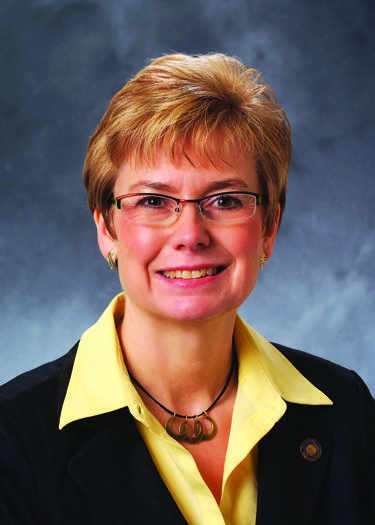Veteran Sherrie Sprenger aims to keep rural realities in legislature.
If re-elected, Sherrie Sprenger says she will continue to take the concerns of rural Linn County to Salem.
Sprenger, of Scio, is the Republican incumbent in House District 17, representing Sweet Home, Lebanon and Stayton since she was appointed to the position in 2008.
She faces Independent Party challenger Jeff Goodwin of Sweet Home. Sprenger received the write-in Democrat Party nomination as well as the Republicans’. Goodwin also has the Libertarian Party nomination.
“The overarching theme is the same that it’s been since I’ve been in,” Sprenger said. That’s making sure that Salem and the rest of the state understands the concerns of her district, a predominantly rural area.
Her job is to make sure east Linn County’s voices are heard, “whether it be the fifth-year program, whether it be minimum wage increases that are different all over the state,” she said.
The fifth-year program, which allowed students to delay official high school graduation while attending community college – for free, was effectively neutralized during the 2015 legislative session. A Portland-area senator led the charge against the program.
The upcoming “predictive work schedule” will be an issue for District 17, Sprenger said. “How’s that work for a farmer in harvest season?’
She recalled working for a farmer at age 14 or 15, and she showed up late to dinner because a heifer was giving birth. She had to stay late and see her job through that night.
The issue is a clear indication of the rural-urban divide, she said.
“Since I came into the legislature, I’ve worked across the aisles,” Sprenger said. “And I have had several pieces of legislation co-chief sponsored by a Democrat. That occurs after you build relationships and trust.
“We have plenty of partisan bickering across the nation.”
“Being written in as the Democratic nominee certainly might suggest I’m not partisan,” Sprenger said. “I have my core values and hold true to those and never compromise them. Most of the issues we deal with in the legislature are what some refer to as middle ground.”
In any case, she wants to be at the table, Sprenger said. If party politics are the focus, she won’t be invited to the table.
“You can have core values and disagree respectfully on issues,” Sprenger said. “I never see myself as a politician, wheeler and dealer and player and don’t want to be. I love the opportunity to serve people in and around the community that I’ve been a part of off and on since I was probably 10 years old.
“Sometimes it takes a law to solve a problem or make things better. Most of the time it doesn’t. That is why I am not the most prolific bill drafter.”
When she entered politics, one of the first things she heard from people in the district was “don’t make laws,” but if “you do, take two off the books,” Sprenger said.
But she loves helping solve problems, she said, talking to a state department head, for example, about a constituent’s problem.
“I love the people in my district and working for them,” Sprenger said. Some she has known since she was a child, while others she knows because of her job.
When she was approached to run for governor, she said, that’s the reason she declined. She didn’t feel she could represent the entire state the way she represents the people of her district.
Coming up, she will continue to work on her cougar legislation, she said. People are still reporting cougar sightings around the district, although she isn’t getting as many reports, which may mean fewer sightings or people are getting frustrated with a lack of action by the state.
She will continue on a county-by-county basis to allow limited cougar hunting with hounds, she said. Some criticize her for trying to overturn a voter decision, but she notes that the law didn’t pass in District 17.
In another area, she has been working with the local district attorney on a children’s issue.
“Basically, it is not against the law that kids live in filth and squalor (with maggots and fecal matter in the house),” Sprenger said. “There needs to be a way to help kids that live in unsafe circumstances.”
The agency that would handle the issue, the Department of Human Services, has its own problems.
“We have to find some resolution,” she said. “We’ve got to fix the problems at DHS. I know there’s a bunch of bills coming forward to help with that.”
But kids in the state’s care are not always receiving safe care from the state, Sprenger said. “The foster system is a mess.”
She knows a number of foster parents who have quit or considered quitting, she said. The state needs a monitoring system in place.
Sprenger remains concerned about the economic condition of her district, she said.
“Lebanon has involved me – Sweet Home could too – into conversations about wetland mitigation issues.”
Lebanon prepares for development ahead of time, and wetlands are in the way of some development. The city recently lost a potential new employer over that, she said.
When a property has a designated wetland, it can still be developed by building a new wetland somewhere else. The process is called wetland mitigation.
She planned to tour Lebanon wetlands this week to learn more.
“There is a perfect opportunity for economic development dollars,” Sprenger said.
“It doesn’t make sense to talk about economic development at the same time the state government’s crushing small business,” Sprenger said, with predictive work schedules, sick leave requirements and minimum wage increases.





